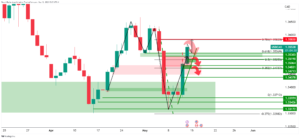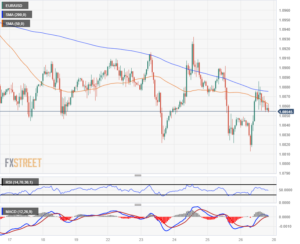
- WTI crude oil prices declined following the start of a truce in the Gaza Strip.
- OPEC+ postpones crucial meetings, sparking speculations of potential oil production cuts for 2024.
- Global factors like higher US crude stockpiles, China’s uncertain oil demand, and non-OPEC production growth contribute to Oil price trends.
West Texas Intermediate (WTI), the US Crude Oil benchmark, fell on Friday as the release of some hostages in Gaza reduced geopolitical tensions. The daily chart showed prices at $75.13 per barrel, even though global business activity witnessed an uptick.
WTI falls to $75.13 per barrel as Gaza truce reduces Middle East risks, while OPEC+ meeting delay and production discussions influence market
A planned truce in the Gaza Strip began, aimed to allow the exchange of hostages between Israel and Hamas. Hence, reduced geopolitical tensions weighed in on oil prices, which usually tend to rise amid risks in the Middle East. However, Oil bears are not out of the woods yet, as the upcoming OPEC+ meeting is awaited, with crude Oil production cuts for 2024 looming.
The OPEC+ delayed its meeting from November 26 to November 30 as countries discussed Oil output levels. The delay led to a significant drop of 5% on Wednesday before WTI trimmed some of its losses to just 1.30%.
There are indications that OPEC+ is making progress toward a compromise with African oil-producing countries regarding production levels for 2024. This development suggests ongoing negotiations and discussions within the group to establish production quotas for the coming year.
While WTI could witness an uptick if OPEC+ cuts its production, higher US Crude stockpiles, and lower refining margins can put a lid on Oil prices.
Additionally, China’s longer-term oil demand outlook remains uncertain. Analysts suggest that oil demand growth in China could weaken to around 4% in the first half of 2024, mainly due to challenges in the property sector that may impact diesel consumption.
Furthermore, non-OPEC production is expected to remain robust, with Brazil’s state energy company, Petrobras, planning significant investments to boost output. This could contribute to global oil supply, potentially limiting upward price movements.
WTI Technical Levels
- SEO Powered Content & PR Distribution. Get Amplified Today.
- PlatoData.Network Vertical Generative Ai. Empower Yourself. Access Here.
- PlatoAiStream. Web3 Intelligence. Knowledge Amplified. Access Here.
- PlatoESG. Carbon, CleanTech, Energy, Environment, Solar, Waste Management. Access Here.
- PlatoHealth. Biotech and Clinical Trials Intelligence. Access Here.
- Source: https://www.fxstreet.com/news/wti-crude-oil-dips-amid-easing-geopolitical-tensions-opec-deliberations-202311242132
- :is
- :not
- 1
- 13
- 2024
- 26
- 30
- a
- activity
- African
- aimed
- allow
- Amid
- an
- Analysts
- and
- ARE
- around
- AS
- At
- awaited
- Bears
- before
- began
- Benchmark
- between
- boost
- Brazil
- business
- CAN
- challenges
- China
- coming
- company
- compromise
- consumption
- contribute
- could
- countries
- crucial
- crude
- Crude oil
- cuts
- daily
- delay
- Delayed
- Demand
- Development
- diesel
- discussed
- discussions
- Drop
- due
- easing
- East
- energy
- establish
- Even
- exchange
- expected
- factors
- Falls
- First
- following
- For
- Friday
- from
- geopolitical
- Global
- global business
- Group
- Growth
- Half
- hamas
- hence
- higher
- hostages
- However
- HTTPS
- if
- Impact
- in
- indications
- influence
- Intermediate
- Investments
- Israel
- ITS
- jpg
- just
- Led
- levels
- like
- looming
- losses
- lower
- mainly
- Making
- margins
- May..
- meeting
- meetings
- Middle
- Middle East
- movements
- negotiations
- November
- of
- Oil
- oil price
- on
- ongoing
- out
- Outlook
- output
- per
- planned
- planning
- plato
- Plato Data Intelligence
- PlatoData
- potential
- potentially
- price
- Prices
- Production
- Progress
- property
- put
- Reduced
- reduces
- refining
- regarding
- release
- remain
- remains
- Rise
- risks
- robust
- s
- sector
- showed
- significant
- some
- start
- State
- Strip
- suggest
- Suggests
- supply
- Technical
- tensions
- that
- The
- this
- though?
- to
- toward
- Trends
- Uncertain
- upcoming
- upward
- us
- usually
- Wednesday
- which
- while
- with
- within
- witness
- witnessed
- Woods
- WTI
- WTI Crude
- year
- yet
- zephyrnet












